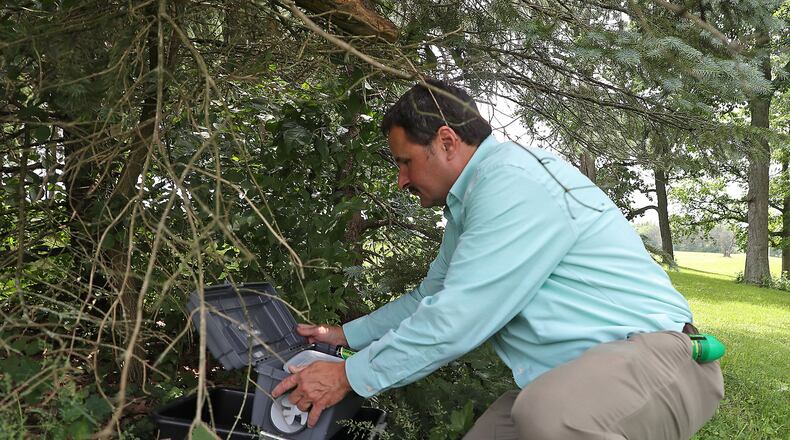The program is aimed at tracking adult mosquito populations and testing them for the West Nile virus, one of the most prevalent mosquito-borne viral infections. There have been no cases of West Nile virus reported in Clark County this season according to the health district. Testing is expected to continue through thesummer.
In order to capture mosquito samples, traps are set up in populated areas with natural foliage, according to CCCHD Environmental Health Director Larry Shaffer.
TRENDING ONLINE: This Springfield man and 14 others were indicted in Clark County this week
Although traps are situated in permanent locations during testing season, residents may contact the health district and request for a trap to be placed in their area, according to Shaffer.
“The traps are designed specifically to sample the mosquitos, said Shaffer. “They’re not really meant to reduce the number of mosquitos in the environment on a large scale.”
Mosquitos are generally most active from sunrise to sunset. They are also naturally acclimated to warm weather, and they lay their eggs in water, according to Shaffer. “Wherever water puddles and stands for about a week is a breeding ground for mosquitos,” he said.
Residents should check objects that tend to accumulate rainwater. Frequent mosquito breeding locations include tires, buckets, gutters, and any outdoor equipment.
Objects designed to hold water should be cleaned regularly or receive constant circulation. Likewise, they should be emptied about every six days, according to Shaffer. “For agricultural environments where there might be watering troughs for livestock, you can put goldfish in the water and they will actually eat the mosquito larvae,” said Shaffer.
Mosquito-borne illnesses can be prevented by wearing long sleeves and pants, avoiding the outdoors during peak mosquito activity hours, keeping windows closed or using a protective screen, and using EPA-approved repellants that contain the active ingredient diethyltoluamide (DEET).
“People should understand that we are monitoring for mosquito-borne diseases in Clark county, but they should assume that the disease are out there, and always take precautions,” said Shaffer.
Should a case of West Nile virus be identified within Clark county, the Health Department will the public via the media, according toShaffer.
How to protect yourself from mosquitos
Use mosquito repellent when outdoors
Use EPA-registered mosquito repellents and closely follow the directions. Repellents containing DEET will provide the most protection. Also cover up. Wear long pants and sleeves to reduce chance of being bitten.
Eliminate standing water around your home
Mosquitos love to lay their eggs in stagnant water. Check for things in and around your home that tend to collect rainwater such as: old tires, buckets, toys, containers, clogged rain gutters. In addition to this, things like bird baths, rain barrels, decorative ponds, or swimming pools should either maintain circulation or be cleaned out regularly.
Make your home a “mosquito-free zone”
Keep windows and doors closed, or at least screened to keep mosquitos out. Check screens regularly for holes or openings where mosquitos may be able to get through.
Be cautious if using insecticides
If you’re considering using pesticides, it may be easier and safer to contract a pest control agency for the task. If you choose to do it yourself, check out the Centers for Disease Control and Prevention (CDC) website at www.cdc.gov for more information.
Souce: Clark County Combined Health District
About the Author
